B2U1L 4教案、学案
B2U1-4英语基础模块2电子教案.doc
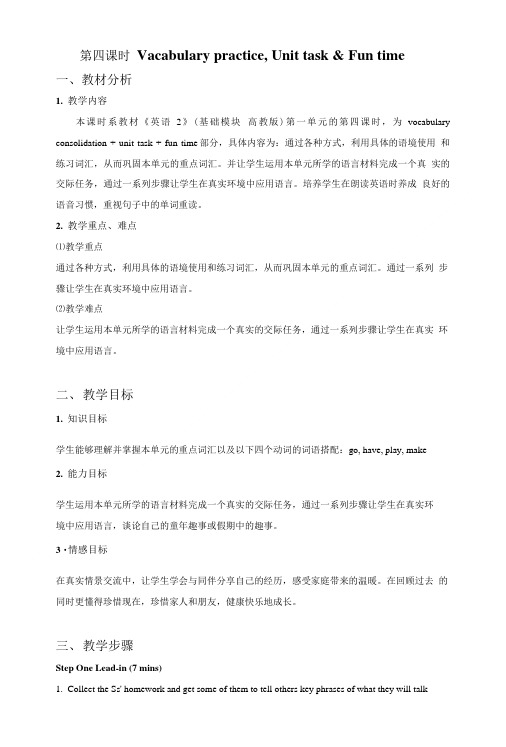
第四课时Vacabulary practice, Unit task & Fun time一、教材分析1.教学内容本课时系教材《英语2》(基础模块高教版)第一单元的第四课时,为vocabulary consolidation + unit task + fun time部分,具体内容为:通过各种方式,利用具体的语境使用和练习词汇,从而巩固本单元的重点词汇。
并让学生运用本单元所学的语言材料完成一个真实的交际任务,通过一系列步骤让学生在真实环境中应用语言。
培养学生在朗读英语时养成良好的语音习惯,重视句子中的单词重读。
2.教学重点、难点⑴教学重点通过各种方式,利用具体的语境使用和练习词汇,从而巩固本单元的重点词汇。
通过一系列步骤让学生在真实环境中应用语言。
⑵教学难点让学生运用本单元所学的语言材料完成一个真实的交际任务,通过一系列步骤让学生在真实环境中应用语言。
二、教学目标1.知识目标学生能够理解并掌握本单元的重点词汇以及以下四个动词的词语搭配:go, have, play, make2.能力目标学生运用本单元所学的语言材料完成一个真实的交际任务,通过一系列步骤让学生在真实环境中应用语言,谈论自己的童年趣事或假期中的趣事。
3・情感目标在真实情景交流中,让学生学会与同伴分享自己的经历,感受家庭带来的温暖。
在回顾过去的同时更懂得珍惜现在,珍惜家人和朋友,健康快乐地成长。
三、教学步骤Step One Lead-in (7 mins)1.Collect the Ss' homework and get some of them to tell others key phrases of what they will talktoday. Get others to guess.SI (Li Jie): went swimming bathed in the sun walked along the beachT: What did Li Jie do last vacation?S2: She went swimming, bathed in the sun and walked along the beach.T: Where did she go?53to SI: Did you go to Sanya?SI: No, I didn't.54to S1: Did you go to Qingdao?S1: No, I didn't. I went to Thailand.T: Who did she go with?55to SI: Did you go with your parents?SI: Yes, I did.(设计意图:这一步骤教师既能对学生的作业情况进行及时地检查,教师在并听的过程中边提出问题,并且问题是结合上一课时的知识点,又可以检查学生们对于一般过去时的掌握情况。
全新版大学英语4教案
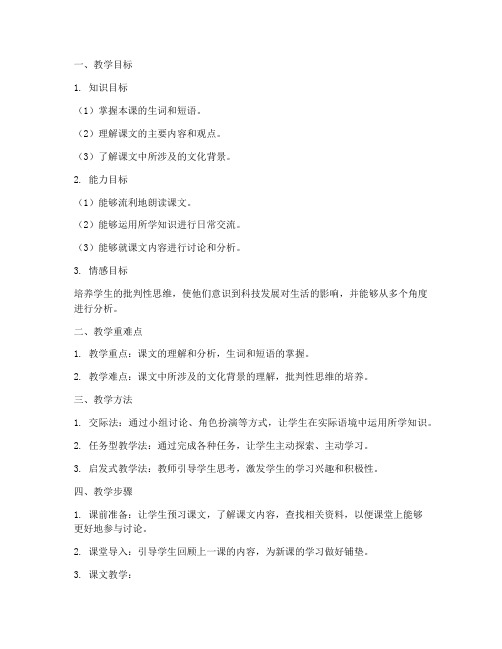
一、教学目标1. 知识目标(1)掌握本课的生词和短语。
(2)理解课文的主要内容和观点。
(3)了解课文中所涉及的文化背景。
2. 能力目标(1)能够流利地朗读课文。
(2)能够运用所学知识进行日常交流。
(3)能够就课文内容进行讨论和分析。
3. 情感目标培养学生的批判性思维,使他们意识到科技发展对生活的影响,并能够从多个角度进行分析。
二、教学重难点1. 教学重点:课文的理解和分析,生词和短语的掌握。
2. 教学难点:课文中所涉及的文化背景的理解,批判性思维的培养。
三、教学方法1. 交际法:通过小组讨论、角色扮演等方式,让学生在实际语境中运用所学知识。
2. 任务型教学法:通过完成各种任务,让学生主动探索、主动学习。
3. 启发式教学法:教师引导学生思考,激发学生的学习兴趣和积极性。
四、教学步骤1. 课前准备:让学生预习课文,了解课文内容,查找相关资料,以便课堂上能够更好地参与讨论。
2. 课堂导入:引导学生回顾上一课的内容,为新课的学习做好铺垫。
3. 课文教学:(1)让学生朗读课文,注意语音语调的准确性和流利度。
(2)讲解生词和短语,让学生能够正确理解和运用。
(3)分析课文内容,引导学生从多个角度理解课文观点。
4. 文化背景介绍:讲解课文中所涉及的文化背景,帮助学生更好地理解课文。
5. 课堂讨论:(1)分组讨论:让学生就课文内容进行分组讨论,分享自己的观点和看法。
(2)全班讨论:邀请学生就讨论结果进行分享,其他学生和教师进行评价和补充。
6. 任务完成:(1)分组任务:让学生分组完成与课文相关的任务,如编写对话、表演短剧等。
(2)全班展示:邀请学生就任务完成情况进行展示,其他学生和教师进行评价和反馈。
7. 课堂小结:对本课内容进行总结,强调重点和难点。
8. 课后作业:布置相关作业,巩固所学知识。
五、教学评价1. 课堂表现:观察学生在课堂上的参与程度、发言情况和表现。
2. 作业完成情况:检查学生作业的完成质量,了解学生对知识的掌握程度。
B2U1学案

单元课题:B2U1Cultural Relics (In Search of the Amber Room)编制: GaoYu YaPing WangLi 审阅:WangXin 使用日期:第14周第2课时【课前预习案】【Learning Aims学习目标】1.To master new words and expressions from the context.2.To improve the reading abilities: scanning, skimming, careful reading.I.【夯基固本】夯实词汇,学习之本A.重点掌握1.稀罕的;珍贵的adj.__________________ adv.__________________ 2.贵重的;有价值的adj.__________________ n.____________________ 3.幸存;生还v.____________________ n. ___________________ 幸存者n.______________4.使吃惊;惊讶v.____________________adj.__________________5.挑选;选择v._________6.设计n.&v.___________7.奇特的adj.__________8.装修;装饰v._________n.____________________9.移动v.______________10.怀疑n.&v.__________11.值得的prep.________12.爆炸v. ____________13.下沉v._____________过去式________________过去分词______________14.非正式的adj._______正式的adj.____________B.识记词汇1. cultural adj._________2. relic n. ___________3.dynasty n.___________4.style n.___________5.jewel n. ___________6.artist n. ___________7. troop n.____________8. wooden adj.________9. local adj. __________10. apart adv. _________11. painting n._________12. trial n. ____________13.evidence n. __________14.entrance n. __________15.sailor n.___________16.maid n. ___________17.debate n./v. ________18.former adj._________C.重点短语1.寻找___________________________2.属于___________________________3.作为报答;回报_________________4.处于交战状态___________________5.少于_______________________6.拆开_______________________7.看重;器重_________________D. 短语汇总(方法指导:在课本P1-2用荧光笔标出,课前达到默写程度)II. Analyze (分析) the difficult sentences.I.【夯基固本】见课件II.【构建语篇】请大家完成《非常学案》P2-3选择题IV.【Homework】根据老师对语言点的预习指导,完成非常学案相关练习。
基础篇B2-Unit1 教案

教案河南大学大学外语教学部教案Unit 1 College CultureUnit overviewCampus traditions form college memories. They unite the students of past and present. They also create a strong connection to the campus for everyone who spent time there. Each college has its beloved culture and traditions that students kept alive through the years, or even through centuries. However,some are forbidden due to various reasons。
After learning this unit,you will get to know your college from a new perspective。
Lesson 1Agenda:1.Lead in (课程导入)2.Audio Studio (语音材料听力练习)3.Speaking Workshop (口语工作坊)4.Home Assignments (课下作业)Part I Lead—inTry to list as many mottos of Chinese universities as you can (both in Chinese and English).Part II Audio StudioListening PassageWord bank:undergraduate n. (尚未取得学位的)大学生participate v。
参加;参与Task 1 Multiple Choices1。
B2U1教案

2. Skills
1. Reading Strategy:reading for the key ideas in sentences
2. Writing Skill: a structure ofthree main parts “introduction, body and conclusion”
3. Critical Thinking: be open to different opinions
课本P9&P11词汇练习
※各种活动穿插
★鉴于学生的词汇量及即将到来的CET4考试需求,本学期仍把词汇作为重要内容,一练发音,二扩词汇,三要应试。搜集相关的真题题目耗时耗力,但是对于学生准确掌握、顺利适应考试的重要性不言而喻。
★词汇示例:distinguished, distinctive, distinct
Board & chalk
Teaching Procedures
Sessions 1&2(100 mins)
教学内容:
1.英语学习技巧的听力练习和自身学习经历的分组讨论
2.介绍背景知识:英语教学和学习的不同理论和流派
3.文章结构及大意
Step 1 Lead-in (15 mins)
活动
Activities
Inspire students to think critically about English grammar in learning English
新编大学德语教案b2e1
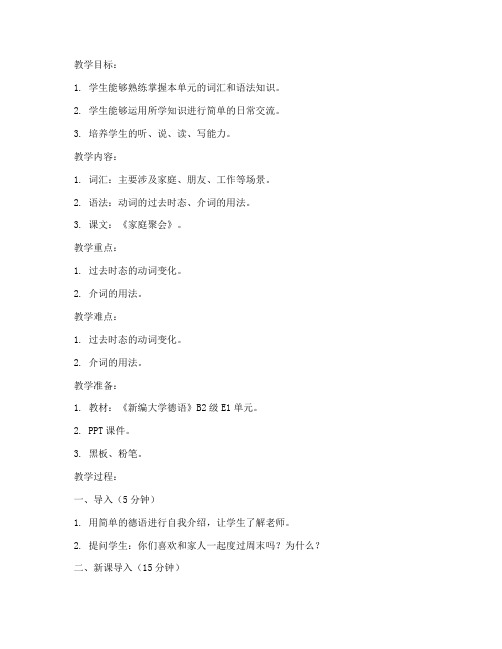
教学目标:1. 学生能够熟练掌握本单元的词汇和语法知识。
2. 学生能够运用所学知识进行简单的日常交流。
3. 培养学生的听、说、读、写能力。
教学内容:1. 词汇:主要涉及家庭、朋友、工作等场景。
2. 语法:动词的过去时态、介词的用法。
3. 课文:《家庭聚会》。
教学重点:1. 过去时态的动词变化。
2. 介词的用法。
教学难点:1. 过去时态的动词变化。
2. 介词的用法。
教学准备:1. 教材:《新编大学德语》B2级E1单元。
2. PPT课件。
3. 黑板、粉笔。
教学过程:一、导入(5分钟)1. 用简单的德语进行自我介绍,让学生了解老师。
2. 提问学生:你们喜欢和家人一起度过周末吗?为什么?二、新课导入(15分钟)1. 引导学生阅读课文,理解课文大意。
2. 分析课文中的词汇和语法点。
3. 讲解动词过去时态的构成方法。
4. 讲解介词的用法。
三、词汇教学(20分钟)1. 展示词汇卡片,让学生跟读并拼写。
2. 创设情境,让学生运用所学词汇进行对话。
3. 课后作业:背诵课文中的词汇。
四、语法教学(20分钟)1. 讲解动词过去时态的构成方法。
2. 用例句说明过去时态的用法。
3. 让学生进行练习,巩固所学知识。
五、课文讲解(15分钟)1. 分析课文中的句子结构。
2. 讲解课文中的语法点。
3. 让学生进行角色扮演,模拟课文中的场景。
六、总结与作业(10分钟)1. 总结本节课所学的词汇和语法知识。
2. 布置课后作业:翻译课文中的段落。
教学反思:本节课通过词汇、语法、课文讲解等多种教学方法,让学生掌握了本单元的知识。
在教学过程中,要注意以下几点:1. 注重学生的口语表达,鼓励学生大胆开口。
2. 注重学生的个体差异,针对不同学生的特点进行教学。
3. 结合生活实际,创设情境,提高学生的学习兴趣。
4. 加强课后作业的布置和批改,巩固所学知识。
教学评价:通过本节课的学习,学生对B2级E1单元的词汇和语法知识有了较深的理解,能够运用所学知识进行简单的日常交流。
1BM2U1 教案

1BM2U1 教案一、教学目标1、知识与技能:(1) word: ball, doll, kite, toy(2) sentence: I like…… It’s……2、过程与方法:(1)通过实物、图片、媒体等直观材料,说说有关玩具类、甜品类和饮料类的单词,并结合已学的句型加以运用。
(2)用I like…的句型来表达自己的喜好,并结合已学单词进行情景对话。
(3)通过教师的动作理解句子的含义,并按教师所给指令做出适当的反应。
3、情感态度与价值观:通过本课的学习,逐步养成良好的饮食习惯。
二、教学过程:Procedures Contents Methods PurposePre-task Preparation Warming up1、 Greeting2、 rhymeOne and two,Red and blue,Up and down,Orange and brown,Kites in the sky,Flying very high.Greeting:Hello!How are you?Good morning!How old are you?Mewo, Mewo, what do you hear?Touch your eye.T: What do you see?(出示图片kite)S: I see a kite.T: What color is it?(演示图片)Now, what do you see?Let’s say the rhyme.以仍球游戏与学生边玩边答,从what do you see?来引到下一环节复习上学期所学的儿歌Task procedure Activity 1Word: toy(1) read(2) according the voice ofthe animals to make a newphrase(3) read the phrasethe toy shopT: do you like the kites?T: do you want to have a kite?T: o.k. Let’s go to the toyshop.e.g.a toy cat , a toy dogShow a picture of the toy shopT: what do you see in the toy利用学过的单词遍词组。
uit4_教案
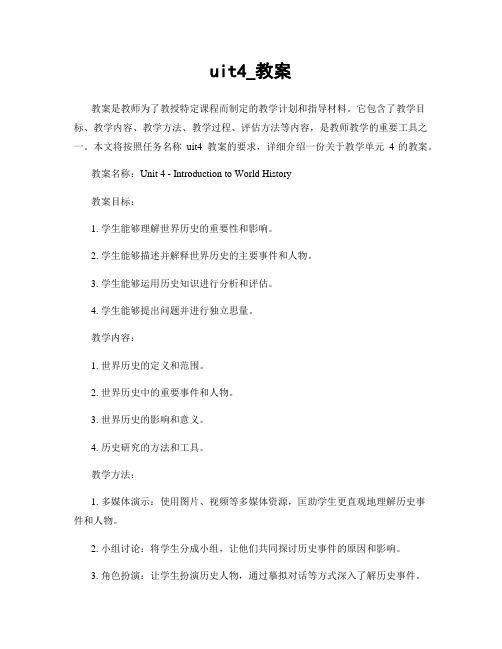
uit4_教案教案是教师为了教授特定课程而制定的教学计划和指导材料。
它包含了教学目标、教学内容、教学方法、教学过程、评估方法等内容,是教师教学的重要工具之一。
本文将按照任务名称uit4_教案的要求,详细介绍一份关于教学单元4的教案。
教案名称:Unit 4 - Introduction to World History教案目标:1. 学生能够理解世界历史的重要性和影响。
2. 学生能够描述并解释世界历史的主要事件和人物。
3. 学生能够运用历史知识进行分析和评估。
4. 学生能够提出问题并进行独立思量。
教学内容:1. 世界历史的定义和范围。
2. 世界历史中的重要事件和人物。
3. 世界历史的影响和意义。
4. 历史研究的方法和工具。
教学方法:1. 多媒体演示:使用图片、视频等多媒体资源,匡助学生更直观地理解历史事件和人物。
2. 小组讨论:将学生分成小组,让他们共同探讨历史事件的原因和影响。
3. 角色扮演:让学生扮演历史人物,通过摹拟对话等方式深入了解历史事件。
4. 问题解答:提出一系列问题,让学生通过独立思量和讨论来回答。
教学过程:1. 导入:通过展示一张世界地图,让学生了解不同国家和地区的历史背景。
2. 知识讲解:使用多媒体演示,讲解世界历史的定义、范围和重要事件。
3. 小组讨论:将学生分成小组,让他们就一个特定的历史事件进行讨论,包括原因、影响等方面。
4. 角色扮演:让学生选择一个历史人物,进行角色扮演,通过对话的方式深入了解历史事件。
5. 问题解答:提出一系列问题,让学生独立思量并回答,加深对历史知识的理解和应用能力。
6. 总结:对本节课所学的世界历史知识进行总结,并提出下节课的预习内容。
评估方法:1. 小组讨论成果评价:评估小组讨论的参预度和质量,包括问题提出、观点陈述、合作等方面。
2. 角色扮演评价:评估学生在角色扮演中的表现,包括对历史事件的理解和表达能力。
3. 问题解答评价:评估学生对问题的回答,包括准确性、逻辑性和扩展性等方面。
新标准大学英语4 B4U1教案
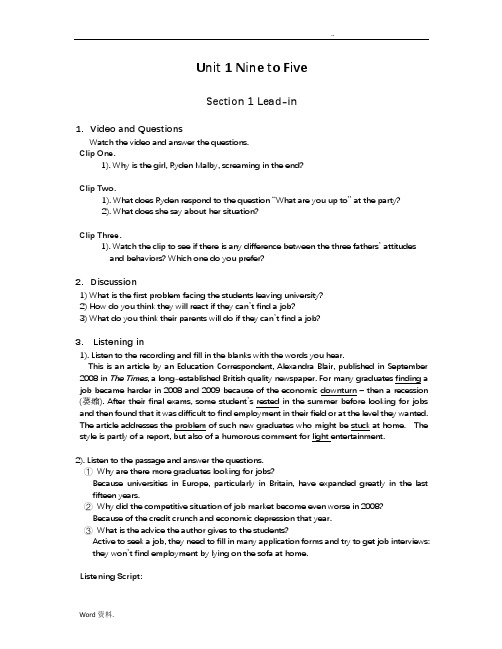
Unit 1 Nine to FiveSection 1 Lead-in1.Video and QuestionsWatch the video and answer the questions.Clip One.1). Why is the girl, Ryden Malby, screaming in the end?Clip Two.1). What does Ryden respond to the question “What are you up to” at the party?2). What does she say about her situation?Clip Three.1). Watch the clip to see if there is any difference between the three fathers’ attitudesand behaviors? Which one do you prefer?2.Discussion1) What is the first problem facing the students leaving university?2) How do you think they will react if they can’t find a job?3) What do you think their parents will do if they can’t find a job?3. Listening in1). Listen to the recording and fill in the blanks with the words you hear.This is an article by an Education Correspondent, Alexandra Blair, published in September 2008 in The Times, a long-established British quality newspaper. For many graduates finding a job became harder in 2008 and 2009 because of the economic downturn – then a recession (萎缩). After their final exams, some student’s rested in the summer before looking for jobs and then found that it was difficult to find employment in their field or at the level they wanted. The article addresses the problem of such new graduates who might be stuck at home. The style is partly of a report, but also of a humorous comment for light entertainment.2). Listen to the passage and answer the questions.①Why are there more graduates looking for jobs?Because universities in Europe, particularly in Britain, have expanded greatly in the last fifteen years.②Why did the competitive situation of job market become even worse in 2008?Because of the credit crunch and economic depression that year.③What is the advice the author gives to the students?Active to seek a job, they need to fill in many application forms and try to get job interviews: they won’t find employment by lying on the sofa at home.Listening Script:Universities in Europe, especially in Britain, have expanded greatly in the last fifteen years, so there are more graduates looking for jobs. This competitive situation became a lot worse in 2008 onwards with the credit crunch and economic depression, which means that there were fewer jobs available and a rise in unemployment. Thus new graduates have to be active to seek a job, they need to fill in many application forms and try to get job interviews: they won’t find employment by lying on the sofa at home.Section 2 Passage Learning1.Background informationCultural Note: Honors Degree1)Most people get a second.2)Traditionally, in the British university system, BA (文学学士) and BS (理学学士) areawarded in different categories: a first class degree (I), a second (IIi or IIii called “a two one” and “a two two”), a third (written III) and a pass degree.3)There are also ordinary degrees with more general courses of study without thesecategories.Key: 2,1,3Generation Y and Grunt1). Work in pairs and answer the question. How to name the generations and characterize them?2). Why is Generation Y is also called Generation Grunt?Complete the passage with the words in the box.express children available experienceIt is an ironic name referring to repetitive, low status, routine or mindless work – this may be the only work available to some graduates, who may have to take very ordinary jobs to get experience .“Grunt” also refers to coarse behavior or bad manners and to the deep sound that is made by a pig. When people “grunt” they express disgust but do not communicate with words – this may be how the parents of new graduates think their children communicate with them!2.Text organizationGeneral structure:Problems after graduation↓Advice for dealing with the problemsDetailed structure:Looking at the from various↓viewpoints↗↗↖↖parents(Paras 1-2) author(Para 3) graduates (Paras 4-6) mother(Paras 7-9)Psychotherapist →←author(Para 16)(Paras 10-15)↓↓Parents’ balance:positive →not making More exampleslife too comfortable↓Better for fathersto help boys after a job setback.↓It’s a good idea toget some jobs like bar work, shelf-stacking.rmation analysisWork in pairs. Look at the sentences and discuss the implied meanings unsaid.1)“Will he ever get a job?” Who is asking this question? What mood does it express?The parents are asking the question.The mood seems to express patience or resignation because the word “ever” suggests that getting a job will take a long time.2)Who describes Generation Y as “rebels without a cause”? Is it a fair description?This is the writer’s description to indicate that this generation is rebelling against parents or society, but they have nothing particular to rebel against.This does not seem very fair because the students are trying to find work – it is just that they don’t like their parents nagging them.3)[Jack] “walked into the university careers service and straight back out again”.What does this suggest about Jack’s character?It suggests that Jack is not very determined. As soon as he saw the queue he left without waiting and without trying to ask about jobs or careers.4)Jack spent the summer “hiding”.Hiding from what? Why are quotation marks used?Hiding from the world of work, staying at home and not looking for a job.The quotation marks tell us that he wasn’t literally hiding, he just spent a lot of time at home.5)How is Mrs. Goodwin’s point of view affected by her own personal experience?In one way her experience hasn’t affected her attitude. She left school and went immediately to a job (without going to university) and has been working full-time since then and yet she is sympathetic and takes a soft line.6)How is Lindenfield’s point of view affected by her own personal experiences?Her personal experience was that she worked in a bar before finding her first proper job as an aerial photographic assistant. So she says such work is a great networking opportunity. If new graduates are good at such work and bright, cheerful and polite, they will soon be promoted. Her personal experience thus reflects –or perhaps has created –her point of view.7)What would the first two paragraphs have focused on if they had been presented from the point of view of the students rather than the parents?The first two paragraphs would have focused on the need for the new graduates to rest for a bit after their hard studies. It is OK for students to relax with the TV or to socialize with friends for a while, then they can start a serious search for employment after that.4.Theme Discussion1)Do you think the Goodwins are good parents?Yes. If they take a hard line with Jack, it will just make him angry: He has already tried to find work and he needs rest and sympathy now. His parents are letting him go to South America. But after that he will have to make a more serious effort and he’ll need to contribute to the household budget, which means he must find work then. So the soft line is the best approach.No, their soft line is not good enough. They should insist that he make more effort and they should actively help him to find work, even a temporary job. Their soft approach just encourages him to delay and by the time he comes back from his holiday all the likely jobswill have been taken. So they are not really helping at all. How can they let him take a three week holiday abroad when he hasn’t got a job to come back.2)Which advice Lindenfield gives to parents do you agree with (if any), and why?I agree with her advice that parents should strike the right balance between being positiveand understanding without making life too comfortable, otherwise students will not look for a job. Her advice about working in a bar or supermarket seems sensible too, because one job can lead to another.3 )Is Jack’s point of view that he doesn’t want to do temporary bar work justifiable?No. He thinks that kind of work is a dead-end job and not suitable for him. But he’s wrong because he has the wrong attitude toward work. A new graduate may expect to start at the bottom: That’s OK while you get experience. If you have a good attitude and work well, you will soon be promoted or you can find a much better job later. He’s unrealistic, I think.4)Do you agree that men can give boys better advice than women when they are stuck in setbacks? Why / Why not?Yes. Men will understand the male point of view better and conversely women will understand a female point of view better. So each gender will give the best advice to someone of their own gender.No, to understand setbacks in the search for work is not a gender issue. I think anyone who knows the situation can give good advice, whether they are male or female.5)Do you think the passage is a fair overview of the problem of graduate unemployment?No, because there is no mention of those who persistently apply for many jobs but don’t get interviews or offers of employment. The article seems to suggest that new graduates sit around at home, but I know many people who really search hard for work. Some find it, some don’t. It’s easy to say that this is a matter of luck, it is a matter of having a positive attitude and being flexible about the first job – you can always change your field of work later.5.SummaryListen to the passage and fill in the blanks with the words you hear.This text is a newspaper article with individual examples of job searching and problems after graduation. The problems are examined from different people’s viewpoints: parents’attitudes towards their jobless children, students’quote about looking for jobs, psychologists’summery of the viewpoints of parents and advice for dealing with the problems, and the author’s own comments. In the end the author concludes that if the graduates cannot find an ideal job, they can take a temporary one.6.Language pointsDifficult sentences1.Those memories of forking out thousands of pounds a year so that he could eat well and goto the odd party, began to fade. (Para 1)2. I passed the exams, but at the interviews they accused me of being ‘too detached’andtalking in language that was ‘too technocratic’, which I didn’t think possible, but obviously it is. (Para 5)3. I went to a comprehensive and I worked my backside off to go to the good university, …(Para 6)4. Carry on life as normal and don’t allow them to abuse your bank account or sap yourreserve of emotional energy. (Para 11)5. After that the son or daughter needs to be nudged firmly back into the saddle. (Para 12)Words to note:1. revert2. comprehensive3. proceed4. transitionPhrases:1. in the same boat2. come full circle3. take a soft/hard line4. strike the right noteUseful expressions:Section 3 ExercisesInstructionsCompulsory Work:1. Learn all the new words and expressions of this unit (Vocabulary Handbook).2. Complete Ex. 3-7 on P5-6. (Ex. 3-4 should be finished when students preview the text.)3. Read the passage in “Active reading (2)” after class and finish Ex. 4-7 on P9.4. Read the passage in “Reading across cultures” after class and finish Ex. 1 on P14.5. Finish “Language in Use” on P12-13.Compulsory Work:1. Learn all the new words and expressions of this unit (Vocabulary Handbook).2. Complete Ex. 3-7 on P5-6. (Ex. 3-4 should be finished when students preview the text.)3. Read the passage in “Active reading (2)” after class and finish Ex. 4-7 on P9.4. Read the passage in “Reading across cultures” after class and finish Ex. 1 on P14.5. Finish “Language in Use” on P12-13.Keys – Active reading (1) (P4)Reading and understanding2. Choose the best answer to the questions.1. c2. b3. a5. c6. dDealing with unfamiliar words: 31. proceed2. transition3. detached4. upcoming5. slump6. revert7. recountDealing with unfamiliar words: 41. transition2. slumped3. proceed4. recounting5. detached6. upcoming7. revertDealing with unfamiliar words: 51. comprehensive2. cop3. aerial4. clutched5. advocate6. healedDealing with unfamiliar words: 61. b2. a3. a4. a5. bDealing with unfamiliar words: 71. b2. b3. a4. a5. a6. a7. a8. aKeys – Active reading (2) (P9) Reading and understanding2. Choose the best answer to the questions.2. d3. a4. b5. c6. cDealing with unfamiliar words: 41. amusing2. fortunately3. loan4. deduct5. highlight6. sympathize7. demandingDealing with unfamiliar words: 51. sympathize2. fortunately3. loan4. demanding5. amusing6. highlight7. deductedDealing with unfamiliar words: 61. belongings2. dropouts3. gamble4. exceeded5. odds6. thriving7. honestyDealing with unfamiliar words: 71. b2. b3. a4. a5. b6. a7. a8. a9. aKeys – Language in use (P12)1. word formation: compound nounsLook at the sentences from the passage Looking for a job after university? First, get off the sofa.… proudly clutched his honors degree for his graduation photo.I don't want to do bar work.Paying for career consultations, train fares to interviews or books …It's a great antidote to graduate apathy.Now write the compound nouns which mean:1) a degree which is awarded a first classa first-class degree2) work in a hospitalhospital work3) a ticket for a plane journeya plane ticket4) a discount for studentsa student discount5) a pass which allows you to travel on busesa bus pass6) a room where an interview is heldan interview room7 ) a period spent in traininga training period2. word formation: noun phrasesLook at the sentences from the passage Looking for a job after university? First, get off the sofa . … most in these financially testing times have no idea what to do next.Now write the noun phrases which mean:1) a career which is rewarding from the financial point of viewa financially rewarding career2)legislation which has been introduced recentlyrecently introduced legislation3)instructions which are more complex than usualunusually complex instructions4)an institution which is orientated towards academican academically orientated institution5)work which makes physical demands on youphysically demanding work6 ) information which has the potential to be importantpotentially important information7)candidates who have been selected after a careful procedurecarefully selected candidates8)a coursebook in which everything has been planned beautifullya beautifully planned course book3. try as … mightLook at the sentence.I try very hard to stay cheerful, but all I ever get is hassle.You can rewrite it like this:Try as I might to stay cheerful, all I ever get is hassle.Now rewrite the sentences using try as … might.1)I’m trying to fill this last page, but I just can’t think of anything.Try as I might to fill this last page, I just can’t think of anything.2)I try to be friendly with Marta, but she doesn’t seem to respond.Try as I might to be friendly with Marta, she doesn’t seem to respond.3)I try hard to get to sleep, but I can’t help thinking about my family.Try as I might to get to sleep, I can’t help thinking about my family.4)He just doesn’t seem to get the promotion he deserves, even though he keeps trying.Keep trying as he might, he just doesn’t seem to get the promotion he deserves. / Keep trying as he might to get the promotion he deserves, he just doesn’t seem to get it.5)I keep trying to remember her name, but my mind is a blank.Keep trying as I might to remember her name, my mind is a blank.4. given that …Look at the sentence.Since I had a good degree, I thought I’d like to go on to get my master’s.You can rewrite it like this:Given that I had got a good degree, I thought I’d like to go on to get my master’s.Now rewrite the sentences using given that ....1)Since I know several languages, I thought I would look for work abroad.Given that I know several languages, I thought I would look for work abroad.2)Xiao Li has the best qualifications, so she should get the job.Given that Xiao Li has the best qualifications, she should get the job.3) Since we’re all here, I think it would be a good idea to get down to some work.Given that we’re all here, I think it would be a good idea to get down to some work.4) Since it’s rather late, I think we should leave this last task until tomorrow.Given that it’s rather late, I think we should leave this last task until tomorrow.5. clauses introduced by thanLook at the sentences from the passage Looking for a job after university? First, get off the sofa.He … has seen more daytime television than is healthy.Lindenfield believes that men are often better at helping their sons, nephews, or friends’sons than are mothers and sisters.Now rewrite the sentences using clauses introduced by than.1)She’s experienced at giving advice. I’m more experienced.I’m more experienced at giving advice than is she.2)You eat too much chocolate. It isn’t good for you.You eat too more chocolate than is good for you.3)She worked very hard. Most part-timers don’t work so hard.She worked harder than do most part-timers.4)You have arrived late too many times. That isn’t acceptable.You have arrived late too more times than is acceptable.5)I don’t think you should have given so much personal information. It isn’t wise.I think you have given more personal information than is wise.6. collocationsRead the explanations of the words. Answer the questions.1)highlight A highlight is the most exciting, impressive, or interesting part of an event. (a) What would you like to be the highlight of your career?I would like the highlight of my student career to be to receive a national award for the beststudent research project.(b) How can you highlight an important sentence in a text?You can underline it with a pencil or pen or you can use highlighters.(c) What are the edited highlights of a football match?The highlights are when someone scores a goal or prevents from being scored.2)loan A loan is an amount of money someone borrows from someone else.(a) Have you ever taken out a loan?No, I haven’t. But my parents have taken out several loans to buy houses.(b) What is the best way to pay off a loan?The best way is to pay a loan off quickly, although you will still have to pay some interest.(c) If you have a library book on loan, what do you have to do with it?You have to return it before the date it is due, otherwise you may have to pay a fine.3)thrive To thrive means to be very successful, happy or healthy.(a) What sort of business thrives best in your part of the country?In my part of the country, light industries and electronics companies thrive best.(b) Which sort of plants thrive in a hot climate?In a hot climate you can see tropical plants and trees thrive.(c) Why do you think some couples thrive on conflict?It is difficult to understand why some couples thrive on conflict. Maybe each one wants to compete with the other, or maybe they enjoy “kissing and making up” after the conflict.7. Translate the paragraphs into Chinese.If you ask me, real life is not all it’s cracked up to be. Twelve years at school and three years at university, teachers banging on about opportunities in the big wide world beyond our sheltered life as students, and what do I find?依我看,现实生活并没有人们想象的那么好。
Teaching Plan L4 B2八年级教案

Teaching Plan L4 B2八年级教案Teaching Plan L4 B2八年级教案Teaching PlanLesson 4 Unit 1 Book 2Teacher:Shu HehuaSchool:No。
3 Middle School ,DanyangTime:September 4,2003Teaching aims:1。
Develop the students’abilities of listening,speaking and reading2。
Learn the new words and review the Simple Present Tense and the Present Continuous Tense Teaching aids:a tape recorder,some slides for shows,exercises for Lesson 4,picturesTeaching Procedures:Step 1:RevisionRevise name dialoguesRevise English names :David William Lewis the full nameCatherine Mary Jones the given /first nameStep 2 :Read and actAsk the students to listen carefullyPlay the tape againRead the dialogue and act it out in pairsStep 3 :ListeningAsk :What are we doing for this exercise?Play the dialogue once,Check the answerStep 4 :ReadRead the text and answer the following questions1。
4BM2U1教案

1. To teach the new phrases:
Show the flash cards for the phrases in ‘Look and say’, and say I can …
Have the students read and spell the words.
S1: What do you like doing?
S2: I like playing football.
…
Then ask each group to complete the report.
____ students like playing badminton.
…
运用已经学过的句型操练新授单词。
2. Answer the question
S1: Yes. I like playing badminton.
3. The students repeat after the teacher.
4. Work in pairs.
3. whose &who’s
4. Pair work
5. Do a survey.
2. Using formulaic expressions to express and accept invitations. E.g. Would you like to come with us?
Oh, sure. I’d love to.
3. Using modeled sentences to describe a person’s likes or dislikes. E.g. She likes playing volleyball, basketball and table tennis.
4BM2U1教案
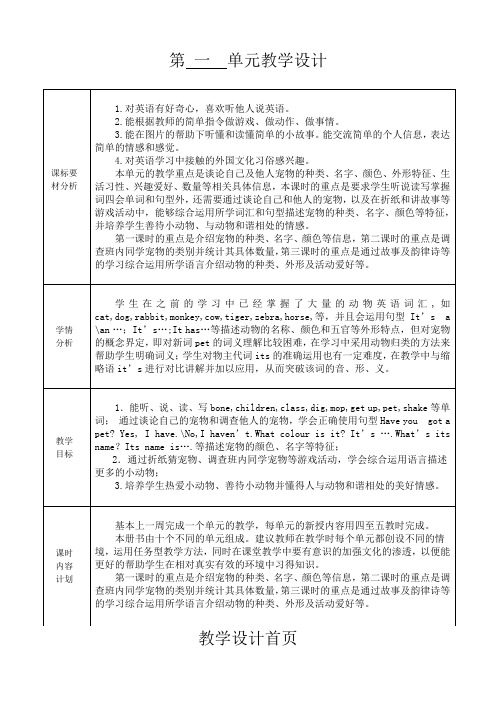
第 一 单元教学设计教学设计首页课标要 材分析1.对英语有好奇心,喜欢听他人说英语。
2.能根据教师的简单指令做游戏、做动作、做事情。
3.能在图片的帮助下听懂和读懂简单的小故事。
能交流简单的个人信息,表达简单的情感和感觉。
4.对英语学习中接触的外国文化习俗感兴趣。
本单元的教学重点是谈论自己及他人宠物的种类、名字、颜色、外形特征、生活习性、兴趣爱好、数量等相关具体信息,本课时的重点是要求学生听说读写掌握词四会单词和句型外,还需要通过谈论自己和他人的宠物,以及在折纸和讲故事等游戏活动中,能够综合运用所学词汇和句型描述宠物的种类、名字、颜色等特征,并培养学生善待小动物、与动物和谐相处的情感。
第一课时的重点是介绍宠物的种类、名字、颜色等信息,第二课时的重点是调查班内同学宠物的类别并统计其具体数量,第三课时的重点是通过故事及韵律诗等的学习综合运用所学语言介绍动物的种类、外形及活动爱好等。
学情 分析学生在之前的学习中已经掌握了大量的动物英语词汇,如cat,dog,rabbit,monkey,cow,tiger,zebra,horse,等,并且会运用句型It ’s a \an …;It ’s …;It has …等描述动物的名称、颜色和五官等外形特点,但对宠物的概念界定,即对新词pet 的词义理解比较困难,在学习中采用动物归类的方法来帮助学生明确词义;学生对物主代词its 的准确运用也有一定难度,在教学中与缩略语it ’s 进行对比讲解并加以应用,从而突破该词的音、形、义。
教学 目标1.能听、说、读、写bone,children,class,dig,mop,get up,pet,shake 等单词; 通过谈论自己的宠物和调查他人的宠物,学会正确使用句型Have you got a pet? Yes, I have.\No,I haven ’t.What colour is it? It ’s ….What ’s its name ?Its name is ….等描述宠物的颜色、名字等特征;2.通过折纸猜宠物、调查班内同学宠物等游戏活动,学会综合运用语言描述 更多的小动物;3.培养学生热爱小动物、善待小动物并懂得人与动物和谐相处的美好情感。
B2R1教案
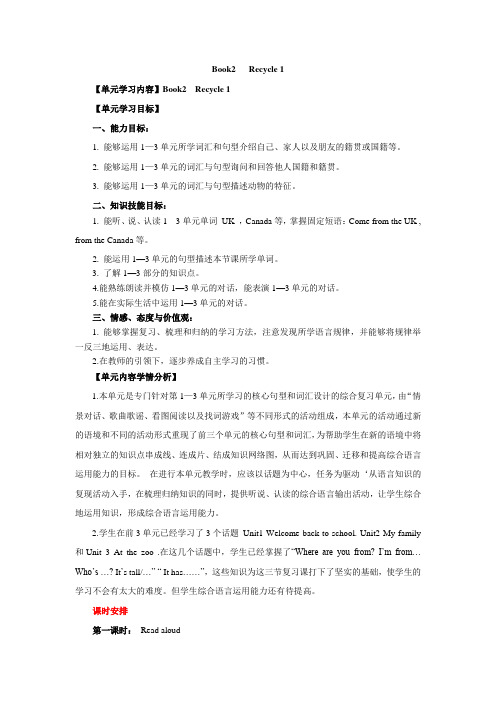
Book2 Recycle 1【单元学习内容】Book2 Recycle 1【单元学习目标】一、能力目标:1. 能够运用1—3单元所学词汇和句型介绍自己、家人以及朋友的籍贯或国籍等。
2. 能够运用1—3单元的词汇与句型询问和回答他人国籍和籍贯。
3. 能够运用1—3单元的词汇与句型描述动物的特征。
二、知识技能目标:1. 能听、说、认读1---3单元单词UK ,Canada等,掌握固定短语:Come from the UK , from the Canada等。
2. 能运用1—3单元的句型描述本节课所学单词。
3. 了解1—3部分的知识点。
4.能熟练朗读并模仿1—3单元的对话,能表演1—3单元的对话。
5.能在实际生活中运用1—3单元的对话。
三、情感、态度与价值观:1. 能够掌握复习、梳理和归纳的学习方法,注意发现所学语言规律,并能够将规律举一反三地运用、表达。
2.在教师的引领下,逐步养成自主学习的习惯。
【单元内容学情分析】1.本单元是专门针对第1—3单元所学习的核心句型和词汇设计的综合复习单元,由“情景对话、歌曲歌谣、看图阅读以及找词游戏”等不同形式的活动组成,本单元的活动通过新的语境和不同的活动形式重现了前三个单元的核心句型和词汇,为帮助学生在新的语境中将相对独立的知识点串成线、连成片、结成知识网络图,从而达到巩固、迁移和提高综合语言运用能力的目标。
在进行本单元教学时,应该以话题为中心,任务为驱动‘从语言知识的复现活动入手,在梳理归纳知识的同时,提供听说、认读的综合语言输出活动,让学生综合地运用知识,形成综合语言运用能力。
2.学生在前3单元已经学习了3个话题Unit1 Welcome back to school. Unit2 My family 和Unit 3 At the zoo .在这几个话题中,学生已经掌握了“Where are you from? I’m from… Who’s …? It’s tall/…”“ It has……”,这些知识为这三节复习课打下了坚实的基础,使学生的学习不会有太大的难度。
丽声我的第一套自然拼读故事书第四级B2 Little Bug 教学设计
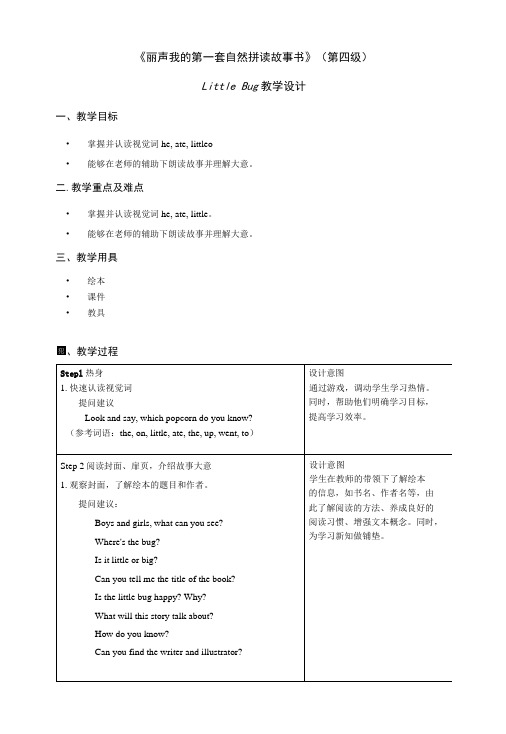
《丽声我的第一套自然拼读故事书》(第四级)Little Bug教学设计一、教学目标•掌握并认读视觉词he, ate, littleo•能够在老师的辅助下朗读故事并理解大意。
二.教学重点及难点•掌握并认读视觉词he, ate, little。
•能够在老师的辅助下朗读故事并理解大意。
三、教学用具•绘本•课件•教具Step 3阅读全书1.共读绘本。
提问建议:-Where9s the little bug?-What did the little bug do?-How was the little bug?-What did the little bug eat?-Did he eat a lot?-What's the little bug's snack?-Where9s the little bug?-How was it?-Why did it run up a twig?-Where's the bug?-How was it?-What did it eat?-Who're the boy and the girl?-Where did they go to?-What would they want to do?-How do you know?-What would happen to the little bug?2.带着问题独立阅读。
提问建议:-What would happen to the little bug?- Who said 'Run, run, little bug'?-Did the little bug manage to run?-What did the little bug do?-Was he safe now?3. Sight words review: type and write(参考词语:he, on, little, ate, the, up, went, to)4.大声朗读绘本,针对有困难的学生教师可给予帮助。
- 1、下载文档前请自行甄别文档内容的完整性,平台不提供额外的编辑、内容补充、找答案等附加服务。
- 2、"仅部分预览"的文档,不可在线预览部分如存在完整性等问题,可反馈申请退款(可完整预览的文档不适用该条件!)。
- 3、如文档侵犯您的权益,请联系客服反馈,我们会尽快为您处理(人工客服工作时间:9:00-18:30)。
A.go for a walk B.goes for a walk C.going for a walk D.go for walk
()6. Don’t _______ the road. It’s too dangerous.
7.Read after the tape.
输
出
与
训
练
拓
展
与
延
伸
巩
固
与
提
升
1. Finish Let’s Do It! No.4.
2.Summarize the grammar “Simple Past Tense”
Practice speaking.
本课小结
Sum up the lesson briefly by practicing all the dialogues in the text.
2.can read and recite the phrases:
go for a walk, take a picture,go down,turn left,
at the traffic lights,go across
nguage items:how to ask the way and how to show way
2. Wang Mei him of takes picture
3. sit classroom I front of the the in
_____________________________________________________________________
4.Friday Dalian we on in arቤተ መጻሕፍቲ ባይዱive
5.does group go the Beijing to
________________________________________________________________
Grade:__________ Date: ____________
重难点
how to ask the way and how to show way
Before class:
介词或副词填空:
1.Don’t climb ______ the tree,it’s dangerous.
2.We will have a lot of fun ______ the city.
Step 4. Language points
1.Recite the key sentences and the key points.
2. Read the text after the tape.
Step 5. Practice
1.Finish the exercises quickly.
2. Learn to say.
go for a walk, take a picture,go down,turn left,
at the traffic lights,go across
nguage items:how to ask the way and how to show way
情感策略
How to ask the way and how to show the way
A.in B.near C.with D.between
( )9. Can you _____ in the park?
A.take a picture B.take photo C.put down D.put on
( )10.” What does it mean_______ Chinese?
A.at B.on C.to D.in
根据汉语提示完成句子
1、让我们做火车吧。Let’s ______ _____ ______.
2、这条河两米宽。The river is ______ _____ ______.
3、它是世界上第一座桥。It is ______ _____ _______ in the world.
3.Welcome ______ our factory.
4.Danny wants to sit _____ one of the horse.
5.They will walk along the road ______ their teachers.
II.汉译英
1.乘火车去兰州__________________ 2.沿黄河散步___________
2.Listen to the tape carefully and complete: Let’s Do It! No.1.
3.Please read thepassage, then complete:
Let’s Do It! No.3.
4. Discuss Let’s Do It! No.4
Step 3. Discuss the key points in the text. Work out the problems and explain them to your classmates.
___________________________________________________________________
___________________________________________________________________
___________________________________________________________________
3.沿着街道走_______________ 4.在交通灯处左拐__________________
5.它是黄河上第一座桥___________________________
In class
1.Listen to the tape carefully and complete: Let’s Do It! No.1.
2.Don’t ________ the road when the traffic lights are red.
3.The street is _______ and clean.
4.We often ______ after supper.
5.Ask and answer in ________.
文化意识
Know something about chinese culture.
重点难点
How to show the way and ask the way.
教学方法
Independent study method, tasked study method, cooperation study method, evaluation method
1.The group takes a train to Lanzhou.
2.They go for a walk along the Yellow River.
3.Let’s go down this street and turn left at the traffic lights
4.This road will lead us to the Yellow River.
单项选择
()1._______ right and you can find a library _____ your left.
A.In ;on B. Turning ;in C. Turn ;in D.Turn ;on
( ) 2. They go straight _______ this street.
教学准备
教师活动
学生活动
导入
Show some pictures of Lanzhou and talk about the picture.
Practice speaking.
输
入
与
呈
现
Step1:Review .
1.介词填空
2.汉译英
Step 2. Presentation
1. Read and recite the new words.
2.Please read the dialogue, then complete:Let’s Do It! No.2.
3. Discuss Let’s Do It! No.3
4.Find out the key points and write them on the notebooks.
___________________________________________________________________
___________________________________________________________________
Practice:选词填空
Group go for a walk bridge cross wide
1.The ________ is over the river.
作业布置
Write a composition about Chinese food.
板书设计
教后反思
平泉四中七年级英语学科学案
课题
Lesson 4
设计人
审核人
学生姓名
班级
学习时间
学习
目标
1.can read and recite the new words :group,bridge,cross,wide,cheese
5.It was the first bridge over the Yellow River.
